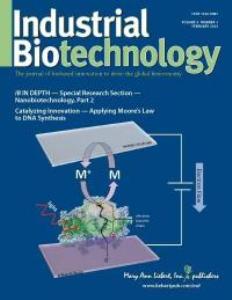Mar 13 2013
The foodborne bacteria Listeria monocytogenes sickens about 2,500 people in the U.S. each year and many more worldwide, killing about 25-30% of those infected. Listeriosis is caused by eating food contaminated with L. monocytogenes, and current methods for detecting the bacteria are costly and time consuming.
 Industrial Biotechnology (http://www.liebertpub.com/ind), led by Co-Editors-in-Chief Larry Walker, PhD, and Glenn Nedwin, PhD, MBA, is an authoritative journal focused on biobased industrial and environmental products and processes, published bimonthly in print and online. © Mary Ann Liebert Inc., publishers
Industrial Biotechnology (http://www.liebertpub.com/ind), led by Co-Editors-in-Chief Larry Walker, PhD, and Glenn Nedwin, PhD, MBA, is an authoritative journal focused on biobased industrial and environmental products and processes, published bimonthly in print and online. © Mary Ann Liebert Inc., publishers
An innovative nanotechnology-based method for developing an inexpensive biosensor to detect the pathogen in food is described in Industrial Biotechnology, a peer-reviewed journal from Mary Ann Liebert Inc., publishers (http://www.liebertpub.com). The articles are available free on the Industrial Biotechnology (http://www.liebertpub.com/ind) website.
Vivian C.H. Wu, PhD led a group of scientists from University of Maine (Orono), National Chio Tung University, and Apex Biotechnology Corp. (Hsinchu, Taiwan), in producing a highly specific, antibody-based immunobiosensing strip with the potential for low-cost commercial development. Danielle Davis, et al. describes their work in the article "Gold Nanoparticle-Modified Carbon Electrode Biosensor for the Detection of Listeria monocytogenes (http://online.liebertpub.com/doi/full/10.1089/ind.2012.0033)."
The article is part of an IB Special Section on Nanobiotechnology, Part 2, led by Co-Guest Editors Norman Scott, PhD, Professor, Cornell University (Ithaca, NY) and Hongda Chen, PhD, National Program Leader, National Institute of Food and Agriculture, USDA (Washington, DC). In their Overview article "Nanoscale Science and Engineering for Agriculture and Food Systems (http://online.liebertpub.com/doi/full/10.1089/ind.2013.1555)," they describe the emerging opportunities and challenges for nanotechnology and nanomaterials research in industrial biotechnology.
The special section also includes two Review articles: "Time Analysis of Poly(Lactic-Co-Glycolic) Acid Nanoparticle Uptake by Major Organs Following Acute Intravenous and Oral Administration in Mice and Rats (http://online.liebertpub.com/doi/full/10.1089/ind.2012.0032)" by Lacey Simon and Cristina Sabliov, Louisiana State University (Baton Rouge, LA); and "Biomarker-Based Nanotechnology for the Improvement of Reproductive Performance in Beef and Dairy Cattle (http://online.liebertpub.com/doi/full/10.1089/ind.2012.0035)" by Peter Sutovsky and Chelsey Kennedy, University of Missouri-Columbia, MO.
Additional original research articles include "Pueraria lobata (Kudzu) Photosystem I Improves the Photoelectrochemical Performance of Silicon (http://online.liebertpub.com/doi/full/10.1089/ind.2012.0036)" by Darlene Gunther, Gabriel LeBlanc, David Cliffel, and G. Kane Jennings, Vanderbilt University (Nashville, TN); and "An Aptasensor Based on Polymer-Gold Nanoparticle Composite Microspheres for the Detection of Malathion Using Surface-Enhanced Raman Spectroscopy (http://online.liebertpub.com/doi/full/10.1089/ind.2012.0029)" by Francisco Barahona, Cameron Bardliving, Adrienne Phifer, John Bruno, and Carl Batt, Cornell University (Ithaca, NY) and Operational Technologies Corp. (San Antonio, TX).
"Nanoscale science continues to play a major role in catalyzing biotechnology innovation, yielding a broad spectrum of devices and products that are addressing many pressing social needs," says Larry Walker, PhD, Co-Editor-in-Chief and Professor, Biological & Environmental Engineering, Cornell University, Ithaca, NY.